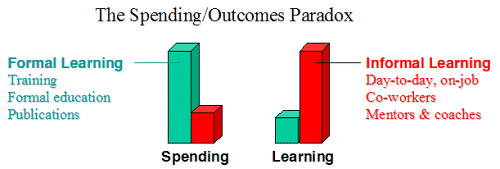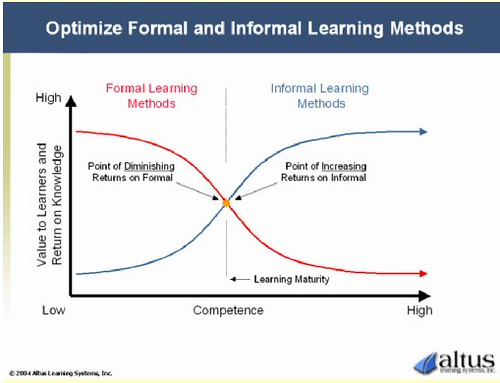Sunday, April 17, 2005
 Formal learning is the authorized, official, scheduled, approved courses and workshops offered in school and by training departments. It's structured.
Formal learning is the authorized, official, scheduled, approved courses and workshops offered in school and by training departments. It's structured. Informal learning is everything else that changes your behavior that's not the result of formal learning or your genetic inheritance. This includes the corporate grapevine, trial and error, calling the help desk, asking your neighbor, reading a book, watching someone who knows how, or teaching someone else. It's unstructured.
Informal learning is everything else that changes your behavior that's not the result of formal learning or your genetic inheritance. This includes the corporate grapevine, trial and error, calling the help desk, asking your neighbor, reading a book, watching someone who knows how, or teaching someone else. It's unstructured.Most learning on the job is informal. Corporations invest heavily in formal. Putting the most money where it will do the least good: I call this the Spending/Outcomes Paradox.

Ted Cocheu, CEO of Altus Learning Systems, dropped by on Friday to help me brainstorm informal learning. Ted has heard me speak frequently enough to know that I'm a fanatic on the power of informal learning. (I have a habit of going overboard when making my case.) He was too polite to put it this bluntly, but I've come close to suggesting "Informal = good; formal = bad."
I realize that the good/bad formula is bogus, but I hadn't put my finger on why. Ted supplied the answer. Novices learn best through formal learning, for it provides the structure, signposts, and scaffolding a newby lacks. Old hands learn best informally, because they already have foundation knowledge, familiarity, and a framework for understanding.
The reverse of these observations is also true. Put novices in totally informal learning situations, and they'll become confused and not get much out of them. Put experienced people in a class, and they will rebel because so much of it is redundant.
For the highest return on knowledge, you need to stay above the line in this graph:

Now of course it's not that simple, for an individual may be a novice in some things and expert in others.
more to come....









6 Comments:
I think everyone would agree around the concept of formal and informal learning. The ideal is to get the appropriate blending of both methods.
Now this notion that formal learning is structured and informal learning is not is interesting. I would argue that a key identifier of formal learning is that it is often dictated to you by others whereas informal learning is about you making a more unrestricted choice, complete flexibility. Both ways I would argue may occur in a structured environment for it is the environment that makes the choices available to you. An online course you progress through sequentially:
vertically
module 1
module 2
module 3
module 4
whereas an online community for example is more open-ended:
horizontally
chat-knowledgebase-discussions
you choose
The other thing is that informal learning typically is of a much shorter duration (chunks) than formal learning.
Now I'm biased but I would also argue that formal learning is interacting with content first and collaboration second (i.e. more content interactions) and that informal learning is the opposite (i.e. more people interactions).
Personally I like more your notion of networks being applied to learning versus formal/informal learning.
Ben, there's obviously room for many interpretations here. (Thank heavens. Otherwise writing a book on it would be a struggle.)
I like your distinction of who's in control more than my characterization in terms of structure. Of course, from my perspective, others impose structure and I individually do what's natural. :-)
Shorter chunks... maybe. Overall, it's more "chunks of the appropriate size." Learning to be an effective labor negotiator may take some long ("iron pants") chunks of hostile informality.
As to leading with content or with collaboration, don't the media determine that? Books are content-laden, as are Google searches, but they're informal, unscheduled learning activities.
Maybe I need another category. Learning could be led by authority, co-created with a peer, or absorbed from inanimate sources.
Thanks for your comments. We'll have to continue this at the CSTD Conference in New Brunswick next month. I expect CSTD to be one of those intimate conferences, like Training Directors Forum, where you actually have time to talk with everyone...and learn informally.
Just a quick thought - perhaps there are two continuums (or is it continua?) here. One is training & education; the other is formal & informal. One is strategy, the other tactics.
Not sure about this, but I'll give it more thought. Good post.
I disagree that novices require structure.
Surely the best example of informal learning is the way in which we learn as infants. Most of it is by observation, mimicry, trial-and-error. Yet in those first few years we scale mountains, compared with the paltry amount we learn later in life. But infants are novices. It is their confusion that IS the learning experience.
The older we get, probably as a result of the conditioning we receive in school, the less patience we have for unstructured learning and the more we want it fed to us. Formal learning is a reaction to that need. It is seen as a way to bring efficiency and focus into the chaos of learning-by-stumbling around.
Once there were apprenticeships which formalized informal learning on the job. But the 20th century industrial-economy division-of-labor need for instant competence and ever-increasing efficiency has taken us ever further from the infant/apprentice modes of learning. The irony is that, in over-formalizing learning, we have abandoned many of the efficiencies that learners value most: timeliness, relevance, focus, and personalization.
Small wonder, then, that we subconsciously revert to those infant/apprentice modes when we feel a need to improve our knowledge or abilities. As we adapt to a knowledge-economy working environment, informal learning becomes more and more essential – for individuals, and for companies.
Godfrey Parkin
Godfrey, your post has stirred my thinking. Let's take the life cycle of a learner back to infancy, then ease into school-age years, to the novice-worker stage, to the effective professional position, and eventually to old hand status. The infant, driven by nature, is pulled to make sense of the world. Nurture kicks in and comes to dominate motivation. Schools and other outside authorities push the learning plans of adolescents and young adults.
As people mature, they claim more and more authority over what and how they learn. Forgive my muddled explanation. Maybe this will help.
I'd also recommend The Educated Mind by Kieran Egan (http://www.educ.sfu.ca/kegan/EdMind.html) for an excellent model on human cognitive development that is applicable to individuals as well as groups. Egan discusses five stages of cognitive development (somatic, mythic, romantic [not what you think], philosophic and ironic). I've found these to be bang on in multiple cases, but no one has taken his work any further.
Post a Comment
<< Home